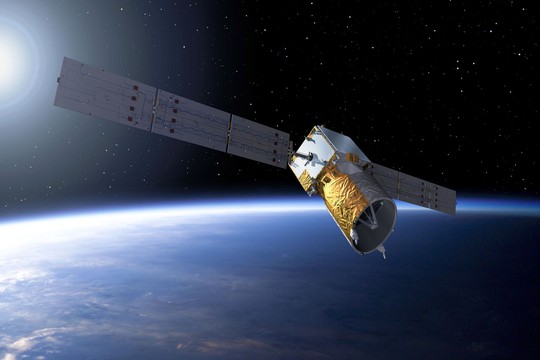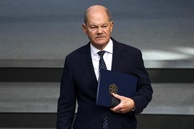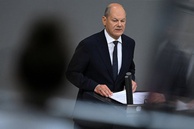Last week, Germany officially unveiled its Space Security Strategy. The November 19 presentation in Berlin was a highly notable event, because this is the first document of its kind adopted in the Federal Republic of Germany, and its presentation by three federal ministers – Defense minister Boris Pistorius, Foreign minister Johann Wadephul, and Minister of Education, Research and Technology Dorothee Bar – only underscored the event’s significance. This time, however, the focus was not so much on, say, Martian research, as on "martial" (related to war) themes. From now on, the ancient god of war becomes the patron of German space, marking a new chapter in the further militarization of the Federal Republic.
Even though Germany boasts one of Europe's most advanced aerospace industries, it had not been previously involved in any ambitious space exploration projects, avoiding any publicity about its military activities in this domain. Instead, Europeans are more familiar with significant German contributions to such pan-European civilian projects as Copernicus (an Earth observation system) and Galileo (a navigation, communication, and environmental monitoring system). As for the Bundeswehr, it was not until January 8, 2007, that the country launched its first military satellite in its entire post-war history. It was part of the SAR-Lupe reconnaissance system, which provides the German military with radar images of the Earth. Currently, the Bundeswehr operates eight spacecraft, still relying on intelligence from other NATO members, primarily the United States.
However, the current demonstrative pivot towards military priorities, as reflected in the Strategy, represents a qualitatively different situation. It is presented as a timely necessity, especially amid the ongoing Ukrainian conflict and Western anti-Russian hysteria. According to foreign minister Wadephul, the war in Ukraine offers a stark example of space having long been transformed from the realm of peaceful research into a "platform for military conflicts and economic competition." "From communication and controlling cruise missiles and drones to extracting strategically important raw materials: the race for dominance in space is in full swing," he noted, adding that to defend Germany's interests in space "we need to further expand our security architecture," which means developing a range of new military-space systems. Because, just as defense minister Pistorius already emphasized, "the German Armed Forces form the basis of the national space security architecture."
The very appearance of the current Strategy is an important step in building this architecture. The 32-page document outlines three main lines of action: a) identifying potential dangers and threats using space; b) promoting international cooperation and a sustainable order in space; and c) "strengthening deterrence, defense and resilience." The Strategy primarily aims to ensure reliable protection of satellites and communication technologies, as well as capabilities for conducting military operations in space. At the same time, Boris Pistorius emphasizes the need for "offensive defense," including the ability to counterattack: "We must, and this is our main task, also have and expand our deterrence and defense capabilities in space. And deterrence there must be convincing." This is a completely new emphasis.
During the presentation, it was also declared that with the new Strategy, the German government would be able to more effectively combat the "arms race of powers in space." What was not explained, however, was how this would be achieved – just a vague statement that "the development of defensible and deterrent space infrastructure is crucial for the safe and peaceful use of space."
The ministers underscored Germany's readiness to implement the new Strategy "quickly," by actively cooperating with partners in Europe and NATO. They made no secret of the fact that such haste is dictated, once again, by the notorious "Russian threat," which Europeans like to bring up today to frighten their citizens to justify any actions and large-scale outlays. Pistorius once again spoke about Russia's alleged disruptions of Western space navigation systems - something pilots from several countries have recently complained about.
"We already see that Russia regularly interferes with GPS signals in the Baltic Sea region," the defense minister noted, not at all bothered by the fact that his accusations remain unproven.
Earlier, when speaking at the space congress held by the Federal Association of German Industry (BDI) in late September, Pistorius tried to engage businesses in military projects by warning them about “aggressive Russia," and also China. He claimed that in recent years, Russia and China have "rapidly ramped up" their space warfare capabilities and are working hard to expand them even further, thus posing a "fundamental threat to Germany and Europe as a whole." He described satellite networks as the Achilles' heel of modern society: "Whoever attacks them paralyzes entire states." The minister claimed that just as he spoke, 39 Chinese and Russian reconnaissance satellites flew over Berlin. Moreover, two Russian "Luch-Olimp" reconnaissance satellites are allegedly monitoring civilian IntelSat satellites, which the Bundeswehr uses among others. He also claimed, without bothering with proof, that China allegedly conducts various close-proximity maneuvers with its spacecraft near foreign satellites, which, if they were airplanes, could be described as air combat exercises.
Based on such "ironclad arguments," the German defense minister announced that the government was launching a 35 billion euro federal military-space program to be completed by 2030. Its goal is to develop both Germany's defensive and offensive capabilities in space, providing the country with satellite constellation infrastructure, ground stations, and secure launch capabilities into space. New early warning, reconnaissance, and communication satellites are to be put in orbit. "Here we rely on a complex approach: small carrier rockets for flexible launches, and in the medium term, European heavy-lift launch vehicles, which will be developed on a competitive basis and, above all, must prove their effectiveness." A special Center for Military Satellite Operations will be set up within the German Armed Forces Space Command, with particular attention to cybersecurity of all space systems.
Inviting the BDI to broad cooperation, Pistorius clearly expected enthusiastic response from the business community. What he got instead, however, was a very pragmatic feedback. While welcoming all the initiatives, the German industrialists drew the minister's attention to the fact that Germany needs to spend much more to catch up with the leading space powers. Indeed, Germany and the European Union as a whole, have in recent years fallen way behind the US and China in space exploration. Germany currently operates just over 80 of its own satellites, while the US operates over 10,000 and China around 900, "and this lag is increasing fast." The BDI cites the results of a study by the German Aerospace Industries Association and the consulting firm Roland Berger, which criticizes decades of continued government underfunding of the space industry, which has already led to negative consequences. For example, in the field of satellite communication, Germany depends too much on other countries. The study predicts that by 2040, the global market for space infrastructure and services will quadruple – from just under 500 billion euros today to 2 trillion euros.
Pistorius has repeatedly emphasized himself that Germany can create a reliable security architecture in space only in collaboration with its European and transatlantic partners. At the same time, Germany is ready to assume greater responsibility as a leader. He promised that this responsibility "will not be limited to the stratosphere."
The steps Germany is currently taking in the military-space domain are essentially the practical implementation at the national level of the goals and objectives previously developed with active German-French participation for the entire European Union. The Space Strategy for Security and Defense that the European Union adopted in 2023 provides for measures to protect space infrastructures, deter threats, and strengthen strategic sovereignty. Just very recently, in mid-October, the European Commission presented the "European Defense Readiness Road Map 2030," which includes the "European Defense Space Shield" project of a unified system for EU countries to counter threats in outer space. While the details of the project and funding volumes are not yet disclosed, no one is making any secret of that fact that this project, like the "road map" itself, was designed with a potential war with Russia in mind. The justification remains the same – "Russia poses a threat to European security in the foreseeable future," and Ukraine is "Europe's first line of defense."
Unwilling to depend on the US and Elon Musk, the European Union plans to create its own satellite network as an alternative to the Starlink network, which will ensure widespread use of secure communication channels for troops and command centers. Apparently realizing the military significance of Starlink during the Ukrainian conflict, Brussels allocated 10 billion euros for a similar program, IRIS2. Expected to become operational by 2030, this network will have only 290 satellites and will not be able to compete coequally with Musk's network, but Europeans still want to achieve at least some independence here.
This first, fully military-oriented project will have to be implemented by the European Space Agency (ESA), which previously engaged in purely civilian projects. This provides for the creation of a network of reconnaissance satellites capable of transmitting ultra-high-resolution photographs of vast areas of the Earth's surface every 30 minutes. ESA has already asked for one billion euros to make this happen. In another major European military project, Germany and France have agreed to work together on the Odin's Eye global early warning satellite system, which will be able to detect missile launches the moment of their lift-off.
The EU has also set itself the task of creating its own rocket launch systems technologically independent from the US, including micro-launch complexes and reusable launch vehicles. So far, with not much success, though. Germany, for example, is developing its own capabilities to launch these satellites into orbit. The Munich-based startup Isar Aerospace is already testing at a launch pad in Norway such rockets capable of lifting up to one ton of cargo into space.
The European military-space projects are bound to receive a powerful boost with the emergence of a new major player in the military aerospace industry. In mid-October, the Franco-German-Spanish aerospace giant Airbus, the French defense group Thales, and the Italian Leonardo announced the creation of a joint venture that will focus on the production of satellites and space systems. It will employ approximately 25,000 people across Europe.
"By joining forces... to strengthen Europe's strategic autonomy in space," the companies stated in a joint press release. The 6.5 billion euro deal, which ushers in a powerful competitor to Elon Musk's SpaceX in Europe, was enthusiastically welcomed by European media.
Meanwhile, Germany's largest arms company, Rheinmetall, which builds tanks, but had not previously been involved in space projects, was among the first to reach out for a slice of the military-space pie. According to the business newspaper Handelsblatt, the company is receiving the first space order in its history to produce satellites for the German Armed Forces. Armin Papperger, the CEO of the company, rapidly growing on military orders, confirmed that the government order involves creating a low-Earth orbit constellation of 40 satellites that Rheinmetall is to deliver to the Bundeswehr within the next two years. The project is currently being examined by the Bundeswehr's procurement office before it goes to the Bundestag's budget committee. According to insiders, this should happen already before the year is out. Armin Papperger is confident of success. Apparently, he would be only happy to become the one who will drive the German "military locomotive" down the path of space militarization.
read more in our Telegram-channel https://t.me/The_International_Affairs

 19:20 25.11.2025 •
19:20 25.11.2025 •



























